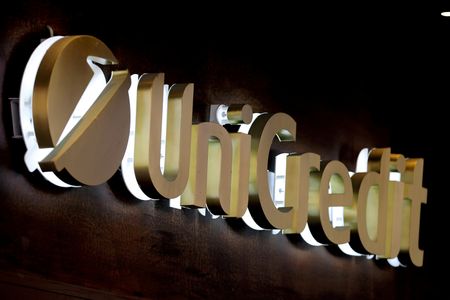By Valentina Za
MILAN (Reuters) – UniCredit on Tuesday galvanised investors by pledging to return 5.25 billion euros ($5.69 billion) from its 2022 earnings after posting a record quarterly profit, as CEO Andrea Orcel works to deliver on his ambitious payout plans.
Orcel, who has focused UniCredit on capital light businesses to maximise returns since taking over in early 2021, said he was confident of receiving approval from European Central Bank supervisors before the bank’s general meeting in April.
His upbeat tone contrasted the cautious note struck by rival UBS, Orcel’s former employer, which also reported on Tuesday, promising to pay out more than $6.7 billion.
Shares in UniCredit soared 12.3% to a near five-year high. UBS fell 2%.
Lenders need ECB approval for share buybacks, which account for almost two thirds of UniCredit’s 2022 capital distribution target in addition to cash dividends.
“We’ve had extensive discussions with the regulators over the distributions and we feel very confident that we will get authorisation to execute them,” Orcel told a media briefing.
ECB supervisors have urged the bloc’s lenders to prudently preserve capital while higher rates and energy bills cloud the economic outlook.
However, the receding chances of a European recession have boosted banking shares, with investors less wary of regulators hindering generous capital distribution plans.
“We read the strong top-up in shareholder remuneration very positively for UniCredit and for those banks with solid capital, overlays, increasing profitability and clean asset quality,” Mediobanca Securities said.
BILLIONS TO SPARE
Orcel, UBS’ former investment banking chief, has bet on capital distribution to boost the appeal of his bank’s shares, which have traditionally traded at a discount to the sector.
Shareholders, who have been promised more than 16 billion euros in dividends and buybacks by 2024, received 3.75 billion euros from 2021 earnings.
Analysts calculate UniCredit could have at least 6 billion euros to spare after delivering on the 16 billion euro payout goal. Orcel said he would assess later whether to return the excess capital to shareholders or use it for acquisitions.
“If we go back to book (value in terms of share price) they’ll use their stock as currency to go take advantage of other people’s problems,” said Cole Smead at UniCredit investor Smead Capital Management in Phoenix, Arizona.
UniCredit trades roughly at half the value of its tangible book.
Smead, in whose $105 million International Value Fund UniCredit is the biggest banking holding, said the market was underestimating Orcel’s ability to continue to drive UniCredit’s share price to book value via the buybacks.
Core capital rose to 16% in the fourth quarter, from 15.4% at the end of September.
The latest distribution plans – which Orcel would like to replicate in 2023 – would leave the core capital ratio at 14.9%, well above UniCredit’s target of 12.5-13.0%.
STRONG PROFIT BEAT
UniCredit’s net profit of 2.46 billion euros for the quarter to Dec. 31 was more than twice the 1.10 billion euros expected by analysts polled by the bank.
The figure includes 852 million euros in tax credits stemming from past losses that higher profitability allowed UniCredit to factor back in.
The tax boost more than offset an increase in generic provisions against future loan losses, known as overlays, to 1.8 billion euros from 1.3 billion.
UniCredit said income from lending jumped 38% from the previous quarter and 43% from a year earlier, as tighter monetary policy widened the gap between the rates banks charge on loans and those they pay to raise funds.
Revenue for the quarter rose to 5.72 billion euros, above a 5.12 billion euro average forecast.
Discounting only one further 50 basis point hike by the ECB, UniCredit expects a net interest margin of more than 11.3 billion euros this year and a net profit in line with 2022.
It said that included its Russian business, after previously excluding it from its profit targets because of the Ukraine war.
“We no longer see Russia as a source of substantial volatility,” Orcel said.
Despite having reduced its cross-border exposure to Russia by two thirds, UniCredit still owns one of the country’s top 15 lenders and Orcel reiterated it aimed to cut its presence “without leaving too much money on the table”.
The rouble appreciation, demand for hedging products and rising rates doubled UniCredit’s Russia revenues to 1.26 billion euros in 2022, though provisions meant the net profit impact was negative.
(Reporting by Valentina Za; editing by Gavin Jones, Jason Neely and Barbara Lewis)

